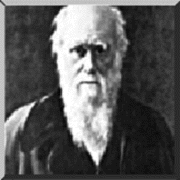 Charles
Robert Darwin
was a naturalist who is best known for his theory on
evolution. Darwin was born February 12, 1809 in Shrewsbury, England.
His father, Robert Darwin, was a physician. His mother, Susannah
Wedgwood Darwin, died when he was eight years old, and he was brought
up by his sister. In December, 1831, Darwin departed as an unpaid
naturalist on a five-year scientific expedition,aboard
the H.M.S. Beagle, where he explored and surveyed the Pacific
coasts and off-shore islands of South America. Under Captain Robert
Fitzroy, he visited Tenerife, the Cape Verde Is, Brazil, Montevideo,
Tierra del Fuego, Buenos Aires, Valparaiso, Chile, the
Galapagos , Tahiti, New Zealand, and Tasmania. Darwin's research
resulting from this voyage formed the basis of his famous book,
Origin
of Species by Means of Natural Selection or Preservation of Favoured
Races in the struggle for Life.
Charles
Robert Darwin
was a naturalist who is best known for his theory on
evolution. Darwin was born February 12, 1809 in Shrewsbury, England.
His father, Robert Darwin, was a physician. His mother, Susannah
Wedgwood Darwin, died when he was eight years old, and he was brought
up by his sister. In December, 1831, Darwin departed as an unpaid
naturalist on a five-year scientific expedition,aboard
the H.M.S. Beagle, where he explored and surveyed the Pacific
coasts and off-shore islands of South America. Under Captain Robert
Fitzroy, he visited Tenerife, the Cape Verde Is, Brazil, Montevideo,
Tierra del Fuego, Buenos Aires, Valparaiso, Chile, the
Galapagos , Tahiti, New Zealand, and Tasmania. Darwin's research
resulting from this voyage formed the basis of his famous book,
Origin
of Species by Means of Natural Selection or Preservation of Favoured
Races in the struggle for Life.
In October, 1836, Darwin returned to Britain. In 1839, he was elected a Fellow of the Royal Society, and 5 days later married his cousin, Emma Wedgwood. In 1882, Darwin died after a long illness, leaving eight children, several of whom achieved great distinction. Though not the sole originator of the evolution hypothesis, nor even the first to apply the concept of descent to plants and animals, he was the first to gain a wide acceptance among biological experts.
Designed by Michael L. Files
Charles Darwin from his Autobiography.
Darwin, Charles. (1859). Origin of Species by Means of Natural Selection or Preservation of Favoured Races in the struggle for Life . London: Murray.
Darwin, Charles. (1887). The Life and Letters of Charles Darwin. New York: D. Appleton and Co.
De Beer, Gavin. (1964). Charles Darwin: Evolution by Natural Selection. New York: Doubleday & Company, Inc.
Dennett, Daniel C. (1995). Darwin's Dangerous Idea: Evolution and the Meanings of Life. New York: Simon & Schuster.